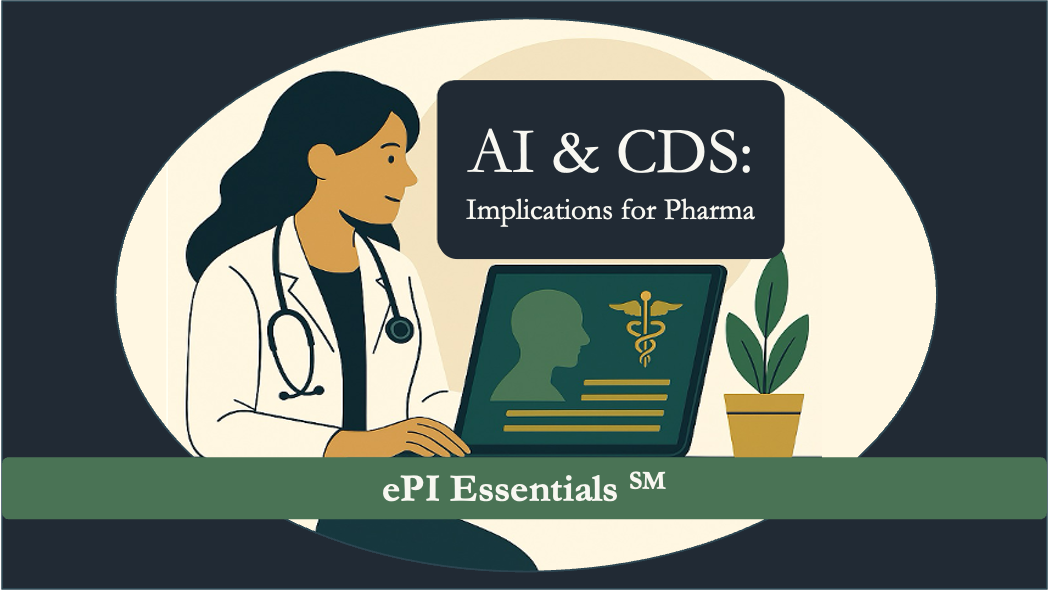Clinical Decision Support in the AI Era: What Pharma Needs to Know
In September 2025, Wolters Kluwer unveiled an evolution in their clinical decision support (CDS)product line: UpToDate Expert AI, a generative AI layer powered by their UpToDate database. For pharmaceutical brands, that means that it’s more important than ever to understand how your product data is represented in compendia databases.
What are the key features of UpToDate Expert AI?
It sources information only from UpToDate content: Unlike other large language models that pull from anywhere on the internet, UpToDate Expert AI is restricted to drawing from UpToDate’s expert-authored, peer-reviewed content.
It allows the user to “see under the hood”: When a clinician asks a question, the answer is accompanied by the assumptions and rationale used, and provides access to the UpToDate source material.
It’s built for workflow integration: UpToDate Expert AI is designed for integration within clinical workflows, including embedding into EHRs. This can result in more standardization of care among users.
So what does pharma need to do?
Understand the risks that AI-powered CDS may impart:
Error amplification and outdated content
If a compendium entry is incorrect or outdated, the AI may surface that misinformation in its recommendations at a large scale.Heightened scrutiny of “bias” or promotional tone
As Wolters Kluwer’s CMO acknowledged, there is sensitivity around pharma influence and bias. Overly promotional or commercial approaches to communicating with compendia may reduce credibility.Slower correction cycles
When AI is embedded in downstream systems, making changes retroactively may be more complex than simply editing a compendium entry. The pipeline from compendia → AI model feeding → clinician output may introduce delays.Clinician trust / overreliance
Because the tool is fast and convenient, some users may lean toward accepting its output without considering additional information. This may make it harder for pharma representatives to speak to label-appropriate use that doesn’t necessarily align with compendia-published recommendations.
Build a plan to avoid risks and capitalize on opportunities:
Proactive auditing and monitoring
It becomes critical to continuously monitor how your product is represented in the databases that feed this, and future, AI tools.Structured, clear, unambiguous product labeling
Use industry standardized language to describe your product within your Prescribing Information, and prepare launch and marketing communications to also align to the same language used by compendia. The more clarity you give, the less room exists for misinterpretation.Transparency and rationale
When submitting updates or seeking corrections, include clear reasoning, evidence, caveats, and clinical logic in communications with compendia. Make it easy for editors by proving your requests have a clinical—not commercial—foundation.Build relationships and credibility with compendia editors
While consultants and advisors can provide a great deal of value in analyzing content (both yours and compendia’s) and help you prepare customized, policy-aligned communications, don’t outsource the “send.” It’s critical to strengthen your company’s trust and reputation as a scientific, evidence-based partner, not just a vendor asking for updates. That can help when nuanced or controversial content needs correction.Rapid escalation paths
Define internal pathways for handling urgent issues (e.g., safety concerns or gross inaccuracies) so these can be addressed quickly, before they start to show up in the AI model’s clinical decisions.
What we’re doing (and how we can help)
At Corvus Solutions, we’ve already built a best-in-industry holistic approach to managing product information as it is developed, communicated, and pulled-through into clinical workflows.
We’re closely tracking the rollout of information that directly impacts the way this, and other AI tools, develop answers and recommendations about our clients’ products.
Our compendia communications emphasize evidence-anchored updates, are formatted within the polices and preferences of each unique compendium, and avoid language that can be misconstrued as overly promotional.
We’re collaborating with clients to build guardrails and response protocols when published information may lead to problematic AI outputs.
We support our clients’ relationships with compendia editors, rather than middle-manning, so our clients are seen as trusted information partners, rather than merely promotional entities.
When your brand is presented clearly and consistently within the databases that feed this new AI-powered clinical landscape, you can feel confident that outputs of these tools are representing your product in predictable, accurate ways. We’d love to help you plan for, enact, and monitor the results of a comprehensive compendia communication strategy.
References
Fierce Healthcare. Wolters Kluwer rolls out gen AI version of UpToDate clinical decision support. Published September 24, 2025. https://www.fiercehealthcare.com/ai-and-machine-learning/wolters-kluwer-rolls-out-gen-ai-version-uptodate-clinical-decision-support
Wolters Kluwer. UpToDate Expert AI: Next-generation clinical decision support powered by generative AI. Accessed October 2025. https://www.wolterskluwer.com/en/solutions/uptodate/ai-clinical-decision-support
Wolters Kluwer Newsroom. Wolters Kluwer’s new UpToDate Expert AI provides clinicians and health systems with the fast, reliable GenAI clinical decision support they need. BusinessWire, September 24, 2025. https://www.businesswire.com/news/home/20250924729666/en/Wolters-Kluwers-New-UpToDate-Expert-AI-Provides-Clinicians-and-Health-Systems-with-the-Fast-Reliable-GenAI-Clinical-Decision-Support-They-Need
Wolters Kluwer AI Labs. Marking the first year of collaboration in developing responsible AI features for UpToDate. BusinessWire, October 17, 2024. https://www.businesswire.com/news/home/20241017090180/en/Wolters-Kluwer-AI-Labs-Marks-First-Year-of-Collaboration-in-Developing-New-Responsible-AI-Features-for-UpToDate
HIT Consultant. Wolters Kluwer Health launches UpToDate Expert AI to accelerate clinical decisions. Published September 24, 2025. https://hitconsultant.net/2025/09/24/wolters-kluwer-health-launches-uptodate-expert-ai-to-accelerate-clinical-decisions
HealthTech Magazines. Integrating AI insights into healthcare workflows: Achieving effective adoption. Accessed October 2025. https://www.healthtechmagazines.com/integrating-ai-insights-into-healthcare-workflows-achieving-effective-adoption
Pons, E., et al. (2023). FUTURE-AI: Guiding principles and evaluation framework for trustworthy AI in medical imaging. arXiv preprint arXiv:2309.12325. https://arxiv.org/abs/2309.12325


